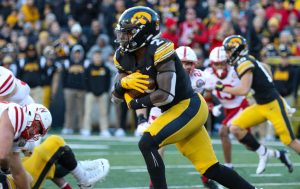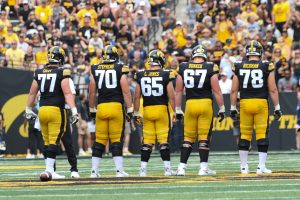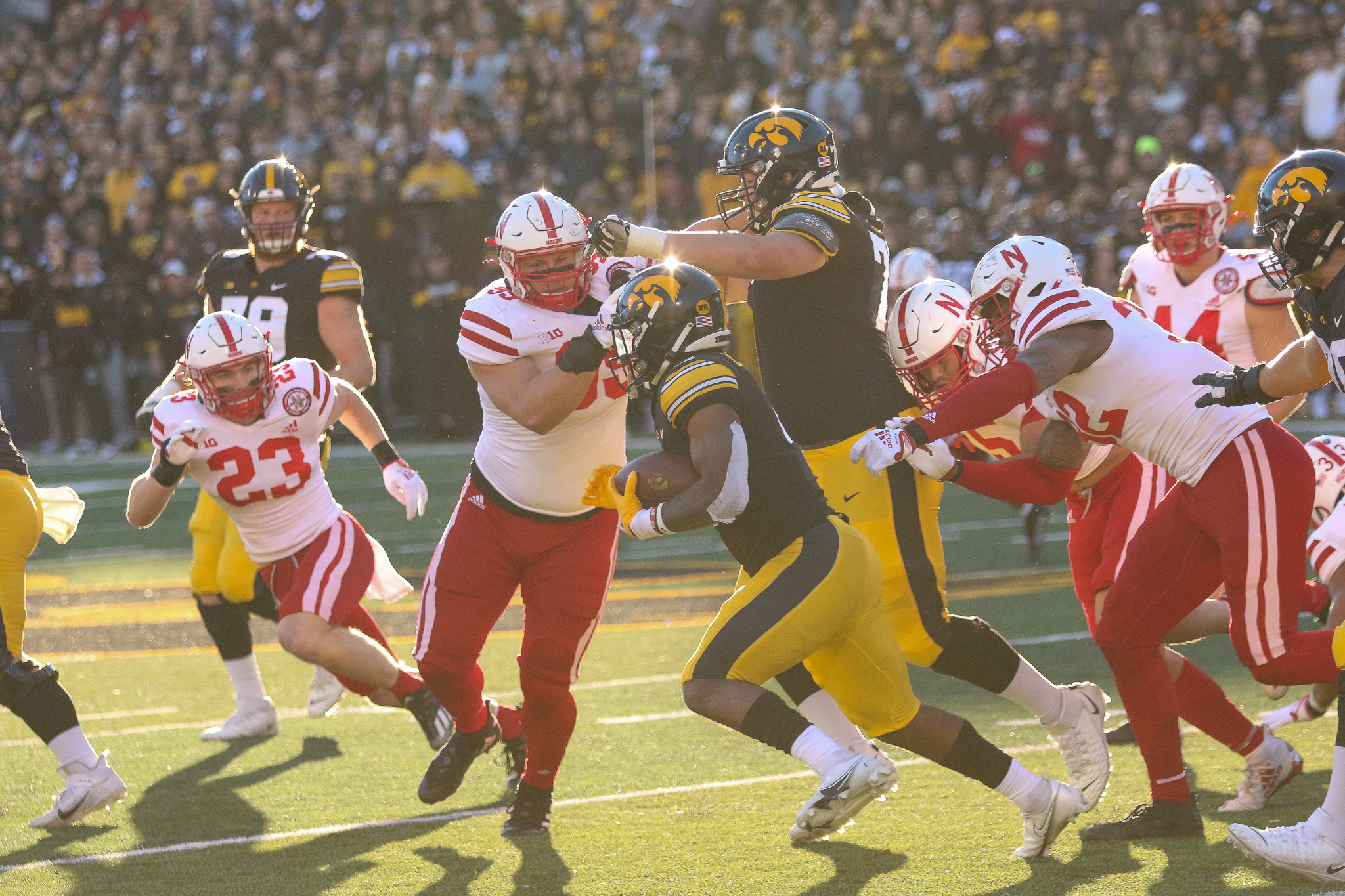Fix on offense has to start with the sputtering rushing attack
By Pat Harty
IOWA CITY, Iowa – While many fans might say that hiring a new offensive coordinator and raiding the tranfer portal should be Kirk Ferentz’s top priorites after the season ends, improving the running game should actually be at the top of his to-do list.
Because without a productive ground attack, it doesn’t matter who is running Kirk Ferentz’s offense as we’ve seen with Ken O’Keefe and Greg Davis as previous offensive coordinators, and with current offensive coordinator, Brian Ferentz.
Iowa’s passing game also needs to be addressed, but it all starts on offense with the ground attack under Kirk Ferentz, whose offensive mentality hasn’t changed much over the past two decades.
Kirk Ferentz wants to control tempo and stay ahead of the chains with a methodical grind-it-out approach in which the run helps to set up the pass.
He believes that his style, and his approach, is more sustainable over time than the spread offenses that are so popular now, and will use his own track record, which includes being ranked third all-time in Big Ten history with 115 wins, to support that belief.
The problem with Kirk Ferentz’s track record is that he has achieved much of his success at Iowa in spite of his offense, and in spite of his running game.
Defense and special teams have been the two guiding forces under Kirk Ferentz, the two phases of the game in which Iowa almost always performs at a high level, with this season no exception.
Iowa’s inability to run the football with consistency has been an ongoing problem as the statistics clearly show.
Here is a sobering statistic that helps to illustrate Iowa’s rushing woes: since the 2004 season, Iowa has finished 10th or lower in the Big Ten in rushing 10 times, and last in the conference in rushing four times, including this season.
Iowa finished the regular season averaging just 97.3 rushing yards per game.

To put how poorly that is in perspective, Minnesota is averaging 218.4 rushing yards per game, and yet, Iowa still defeated the Gophers 13-10 this season thanks to winning the turnover battle and to having an opportunistic defense and reliable special teams.
But there have been numerous games in which the inability to sustain a ground attack has cost Iowa in the win column.
In four of Iowa’s five losses this season, it was held to 58 or fewer rushing yards, the one exception being last Friday’s loss 24-17 to Nebraska when Iowa gained 124 yards on the ground.
No one player, or one position is to blame for the rushing deficiencies because it takes a group effort, and the right mentality and strategy, for a rushing attack to be successful.
As talented as true freshman Kaleb Johnson is as a running back, he in some ways is only as good as his offensive line.
Johnson has shown this season what he can do with just adequate blocking as he has rushed for over 100 yards in three games.
Sophomore Leshon Williams also has had his moments this season as a running back.
Johnson and Williams both seem more than capable of holding up their end of the deal, and yet, Iowa still finished the regular season ranked last in the Big Ten in rushing despite running a ball-control offense.
Kirk Ferentz wants to run a ball control offense that hopefully will control tempo and shorten the game, and he has stuck to that approach throughout his 24 seasons as head coach despite Iowa’s long-standing rushing woes, and despite the way defenses have evolved.
Iowa has built a tradition of developing star offensive linemen under Kirk Ferentz, with former All-America center Tyler Linderbaum the latest example.

But as a unit, most of the Iowa offensive lines have been mediocre at best, at least from a statistical standpoint.
Iowa’s 2019 offensive line included Linderbaum at center, and Tristan Wirfs and Alaric Jackson at the two tackle positions.
All three currently start in the NFL, and Linderbaum and Wirfs were both NFL first-round draft picks, and yet, Iowa still finished the 2019 season ranked just 10th in the Big Ten in rushing in 2019, averaging 137.6 yards per game.
Joe Philbin, Reese Morgan, Brian Ferentz and George Barnett have all coached the offensive line under Kirk Ferentz with Barnett currently in his second season.
Philbin helped lead the resurgence by building what became the 2002 offensive line, which is arguably the best offensive line to play under Kirk Ferentz at Iowa.
Of course, Philbin had help from Kirk Ferentz, as have all the offensive line coaches at Iowa, because that is Kirk Ferentz’s area of expertise.
Kirk Ferentz coached the offensive line under Hayden Fry at Iowa from 1981 to 1989, and for six seasons in the NFL, before replacing Fry as the Iowa head coach shortly after the 1998 season.
Kirk Ferentz knows more about run blocking and about building an offensive line than just about anybody, and yet, his offensive lines, despite having individual stars, have a history of under-performing if you base it on rushing statistics.
That is probably the strangest thing about Hawkeye football under Kirk Ferentz, and it’s the one thing that has to get fixed before anything else on offense because it won’t matter who the offensive coordinator is if Iowa can’t sustain a rushing attack.
Iowa rarely has had a mobile quarterback under Kirk Ferentz, and if you can’t sustain a ground attack, and your quarterback is a sitting duck in the pocket, you’re just asking for trouble.
Spencer Petras has shown that he can make plays if he has a productive running game to keep defenses occupied.
But if he doesn’t, Petras becomes an easy target due to his lack of mobility.
Iowa is a different team when it can sustain a ground attack.
And yes, you could probably say that about any team.
But with Iowa, it has even more significance because everything is built around being able to run the football.
Even the way Iowa recruits on offense caters to having a strong running game.
Could Iowa use more talent at quarterback and at receiver?
Absolutely.
But Kirk Ferentz has shown that he and his assistant coaches are much better at recruiting offensive linemen than quarterbacks and receivers, so you’d think that would help the running game.
There is talk that Iowa will land a quarterback and a receiver or two from the transfer portal, and Michigan quarterback Cade McNamara already has been mentioned as a possibility for Iowa.
McNamara entered the portal on Monday, and shortly thereafter Iowa was being mentioned as a potential landing spot for him.
And while that would obviously be perceived as taking a step forward, there is no guarantee that it would help the running game.
In fairness to the offensive lines under Kirk Ferentz, it’s not as if many were blocking for future NFL running backs with Ladell Betts and 2008 Doak Walker Award winner Shonn Greene the only former Iowa running backs under Kirk Ferentz to play in the NFL for an extended period.
You run as a team, and you don’t run as a team.
Kirk Ferentz has plenty to address this offseason on offense.
But if he doesn’t take steps to fix his running game, the other stuff won’t matter nearly as much.
Hawkeye rushing woes under Kirk Ferentz
Year, Big Ten finish in rushing, average rushing yards per game
2022, 14th, 97.3
2021, 11th, 123.6
2020, 6th 171.1
2019, 10th, 137.6
2018, 10th, 148.4
2017, 11th, 139.2
2016, 8th, 171.8
2015, 5th, 181.7
2014, 7th, 163.1
2013, 6th, 179.9
2012, 12th, 123.0
2011, 12th, 137.7
2010, 8th, 148.4
2009, 10th, 114.2
2008, 4th, 188.7
2007, 10th, 126.3
2006, 7th, 143.5
2005, 7th, 174.7
2004, 11th, 72.6



